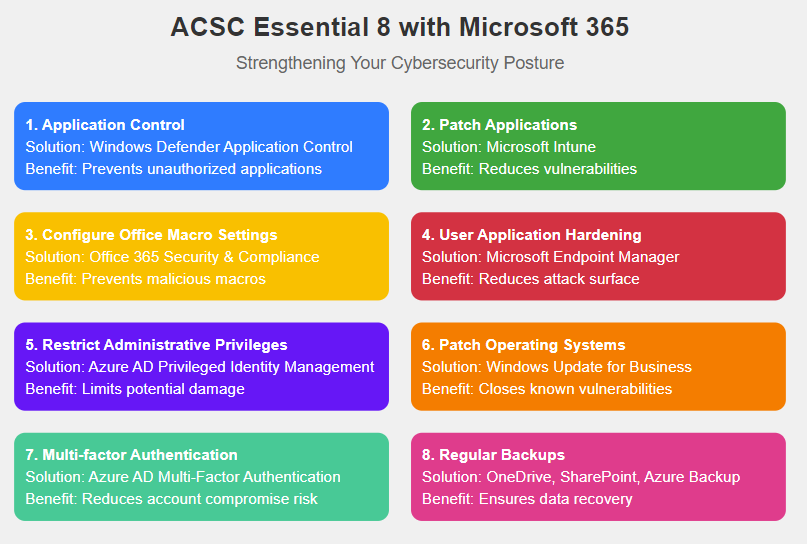The ACSC Essential 8 with Microsoft 365: Strengthening Your Cybersecurity Posture
In today’s digital landscape, cybersecurity is more critical than ever. The Australian Cyber Security Centre (ACSC) has developed the Essential Eight, a baseline set of mitigation strategies to help organizations protect themselves against various cyber threats. In this blog post, we’ll explore how Microsoft 365 can help implement these strategies and the benefits of doing so.
Understanding the ACSC Essential Eight
The ACSC Essential Eight consists of the following strategies:
- Application Control
- Patch Applications
- Configure Microsoft Office Macro Settings
- User Application Hardening
- Restrict Administrative Privileges
- Patch Operating Systems
- Multi-factor Authentication
- Regular Backups
Let’s dive into how Microsoft 365 can help implement these strategies and the benefits they bring.
Implementing the Essential Eight with Microsoft 365
1. Application Control
Microsoft 365 Solution: Windows Defender Application Control (WDAC) and AppLocker
Implementation Benefits:
- Prevents unauthorized applications from running
- Reduces the risk of malware and ransomware infections
- Improves system stability and performance
2. Patch Applications
Microsoft 365 Solution: Microsoft Intune and Windows Update for Business
Implementation Benefits:
- Ensures all applications are up-to-date with the latest security patches
- Reduces vulnerabilities that could be exploited by attackers
- Improves overall system performance and stability
3. Configure Microsoft Office Macro Settings
Microsoft 365 Solution: Office 365 Security & Compliance Center
Implementation Benefits:
- Prevents malicious macros from executing
- Reduces the risk of macro-based malware
- Allows for granular control over macro execution policies
4. User Application Hardening
Microsoft 365 Solution: Microsoft Endpoint Manager and Intune
Implementation Benefits:
- Hardens applications against common attack vectors
- Reduces the attack surface of your organization
- Improves overall security posture without impacting user productivity
5. Restrict Administrative Privileges
Microsoft 365 Solution: Azure Active Directory (Azure AD) Privileged Identity Management
Implementation Benefits:
- Limits the potential damage from compromised accounts
- Improves audit trails and accountability
- Reduces the risk of insider threats
6. Patch Operating Systems
Microsoft 365 Solution: Windows Update for Business and Microsoft Intune
Implementation Benefits:
- Ensures all systems are running the latest, most secure version of the operating system
- Closes known vulnerabilities that could be exploited by attackers
- Improves system stability and performance
7. Multi-factor Authentication
Microsoft 365 Solution: Azure AD Multi-Factor Authentication
Implementation Benefits:
- Significantly reduces the risk of account compromise
- Provides an additional layer of security beyond passwords
- Offers flexible authentication options to suit user needs
8. Regular Backups
Microsoft 365 Solution: OneDrive for Business, SharePoint Online, and Azure Backup
Implementation Benefits:
- Ensures data can be recovered in case of ransomware attacks or accidental deletion
- Provides versioning and point-in-time recovery options
- Offers geo-redundant storage for added reliability
Conclusion
Implementing the ACSC Essential Eight with Microsoft 365 not only strengthens your organization’s cybersecurity posture but also brings numerous benefits in terms of efficiency, productivity, and compliance. By leveraging the integrated security features of Microsoft 365, organizations can create a robust defense against cyber threats while maintaining a seamless user experience.
Remember, cybersecurity is an ongoing process. Regularly review and update your security measures to stay ahead of evolving threats. With Microsoft 365 and the ACSC Essential Eight as your foundation, you’ll be well-equipped to face the challenges of today’s digital landscape. Reach Sysnet Infocom for consultation and implementation Sales@sysnetinfocom.com


Comments are closed